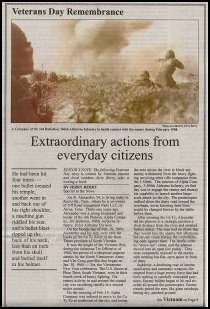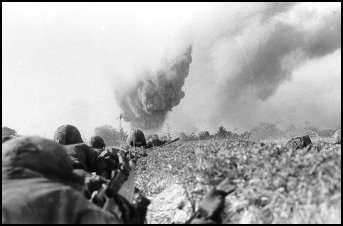|
Lt. Joe Alexander's Story
(Published
Every war
is full of stories of heroic acts, and there are many levels of heroism.
Every soldier on the field of battle is a hero just by the simple fact
that he has the courage to face the enemy. Some individuals take a step
further and go above and beyond the call of duty. Many heroes pay the
ultimate price and give their lives for another. Others perform heroic
acts and live with the memory of their fallen comrades. Those unsung war
heroes reside in communities across our nation. This is a story about
one of them. By Jerry Berry
HEROES AMONG US
|
Joe R. Alexander, 54, is today living in Knoxville, Tennessee
and co-owner of Off Road Equipment Parts LLC, in Alcoa, TN.
Thirty-one years ago, Alexander was a young lieutenant and
leader of the 4th Platoon, Alpha Company, 3rd Battalion, 506th
Airborne Infantry, 101st Airborne Division. On the bloody day of
Feb.19, 1968, Alexander and his men were near the banks of the
Ca Ty River in the Binh Thuan province, South Vietnam.
It was the height of the Vietnam War, during the infamous Tet
Offensive of 1968, the period of widespread surprise attacks by
the North Vietnamese Army and Viet Cong guerillas that began on
Tet - Jan. 30, 1968 - the Vietnamese New Year celebration. The
U.S. forces at Phan Thiet, South Vietnam, were in their fourth
week of heavy fighting. The enemy activity in and around the
coastal city was escalating rapidly in a second major assault.
|
 |
|
On the morning of Feb. 19, Alpha Company, commanded by Captain
Thomas F. Gaffney was ordered to move to the Ca Ty River
northwest of the city and sweep the area across the river to
block any enemy withdrawal from the heavy fighting involving
other rifle companies from the 3-506th.
The mission of Alpha Company, 3-506th Airborne Infantry, on that
day was to engage the enemy and destroy his capability to launch
another large-scale attack on the city. The paratroopers walked
down the dusty road toward the riverbank, never knowing their
lives would be changed forever by the battle before them.
After crossing the Ca Ty, Alexander led his platoon to a
strategic position a short distance from the river and awaited
further orders. The men had no doubt that they would face the
enemy that afternoon, but no one could foresee the overwhelming
odds against them. The fateful order to "move out" came, and the
platoon moved into an open rice paddy. They were completely
exposed to the enemy with nothing but flat, open space in front
of them.
Suddenly, a deafening roar of intense small arms- and automatic
weapons fire erupted from a huge enemy force that had been
waiting in carefully concealed positions. Enemy bullets began to
hit and ricochet all around the paratroopers. Enemy rounds
pelted the men like giant raindrops hitting dry, parched ground.
|
 |
Soldiers began to drop from the murderous wall of gunfire.
Alexander was wounded in the initial burst of enemy gunfire but
continued the desperate attempt to maneuver his men out of the
killing field to cover. He repeatedly refused medical aid for
himself on the battlefield and instructed the medics to take
care of his men.
The heat of battle did not subside until darkness began to fall.
The last of the wounded were being
|
|
transported out when Alexander was finally loaded onto a
helicopter and taken back to base to receive medical attention.
He had been hit four times - one bullet creased his temple,
another went in and back out of his right shoulder, a machine
gun riddled his rear, and a bullet blast ripped up the back of
his neck, less than an inch from his skull and buried itself in
his helmet. As the helicopter lifted from the ground, Alexander
surveyed a devastating scene. The rice paddy below was dotted
with bodies. He would learn later, that of the 40-member
platoon, eight was killed and 20 others wounded. "My platoon had
walked into a well-established ambush with the enemy in
fortified bunkers," Alexander recalled decades later. "It was a
horrible moment … a memory that I have suppressed for 32 years.
I wanted to forget that moment in history. It can't be deleted …
it was permanently etched in my mind, engraved in my heart and
absorbed into my emotions."
Alexander recovered from his wounds, continued his military
service after Vietnam and completed his career with the
Tennessee Army National Guard, retiring in 1995 as a colonel
with the 278th Armored Cavalry Regiment in Knoxville. Among his
service awards are the Silver Star, Bronze Star with combat V,
Combat Infantryman Badge, Purple Heart, Army Commendation Medal
and the Vietnam Gallantry Cross.
|
|
Alexander was reunited with a few of his fellow paratroopers at
the 506th Association Reunion in July 1997 at the Knoxville
Downtown Hilton Hotel and with even more men from his former
platoon and battalion in July 1998 at the 506th Association
reunion in Reno, Nevada.
Since then Alexander has devoted much time and effort to find
and reunite every surviving member of Alpha Company, 3-506th, as
well as members of other companies who served
|

Firefight in Rice Paddy |
|
with the 3-506th in Vietnam. His work contributed greatly to the
success of this year's 3-506th reunion, held in August in
Hampton, Virginia.
To date, more than 200 members of the 3-506th have been found,
and the effort to find others continues daily.
Through Joe Alexander's efforts, a display of 3-506th
photographs and other memorabilia from his battalion's
participation in the Vietnam War is in place at the Pratt Museum
at Fort Campbell, Ky.
"The 3-506 was the best unit of professional people that I have
ever had the opportunity to serve with," Alexander says. "A
soldier's duty is to fight. In combat, fighting includes killing
or being killed. One of the Ten Commandments says, "Thou shalt
not kill," but it doesn't say 'except in war.' Every day I pray
for forgiveness and ask for eternal peace for those who died,
both friendly and enemy."
Epilogue
There are many more stories such as this one that should be told
for the sake of posterity. Our children need to understand the
true meaning of self-sacrifice and heroism. How many young
people of today would die for their country in a far away place?
How do they define patriotism? Who would they name as their
hero? There are many true heroes among us-those that claim no
recognition for their heroic acts and continue to live their
lives in obscurity as the world goes on around them.
Lt. Joe Alexander and those who fought with him are true
patriotic heroes. They fought the battles, remained steadfast in
their dedication to duty, and suffered in silence as our nation
diminished their role in an unpopular war. True heroes often go
unrecognized unless their specific stories are told, and there
are many other fine soldiers who deserve to have their stories
told as well. I am currently writing a book about the day-to-day
activities of the 3-506th during its first year in Vietnam
(October 1967 to October 1968), including the infamous Tet
Communist Offensive of 1968. The title of the book will be "They
Called Us Currahees" and will include many true stories such as
this one, along with pictures and personal interviews with
fellow paratroopers during and after battles. It documents the
serious side of war, as well as the humorous side of our tour of
duty in Vietnam. The book will be completely factual, without
hype, and tells of the many heroic and ultimate sacrifices that
the men of the 3-506th like Lt. Joe Alexander made for our
country."
Jerry Berry, a paratrooper served with Joe Alexander in Vietnam.
After arriving with his unit in Vietnam, he became the battalion
combat photographer/reporter. A retired U.S. Forest Service
wildlife biologist, he lives in Libby, Montana with his wife and
four children. The 506th Airborne Infantry Regiment (WW II) was
recently featured in the Spielberg movie "Saving Private Ryan".
Spielberg's is currently working on a 13 part mini-series, again
about the 506th Airborne Infantry Regiment, 101st Airborne
Division, during WW II, and based on the novel "Band of
Brothers" by Stephen E. Ambrose. |
|
|